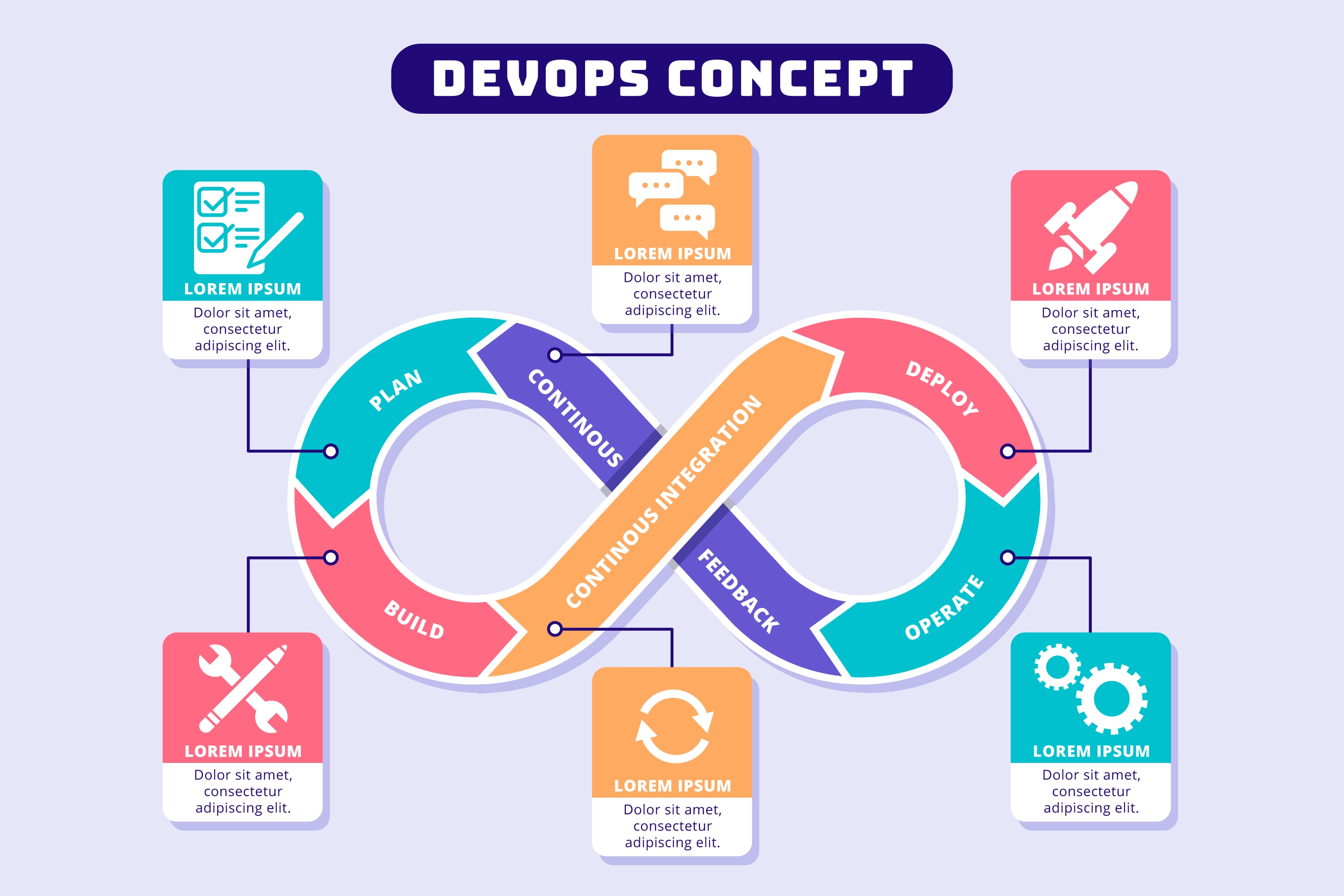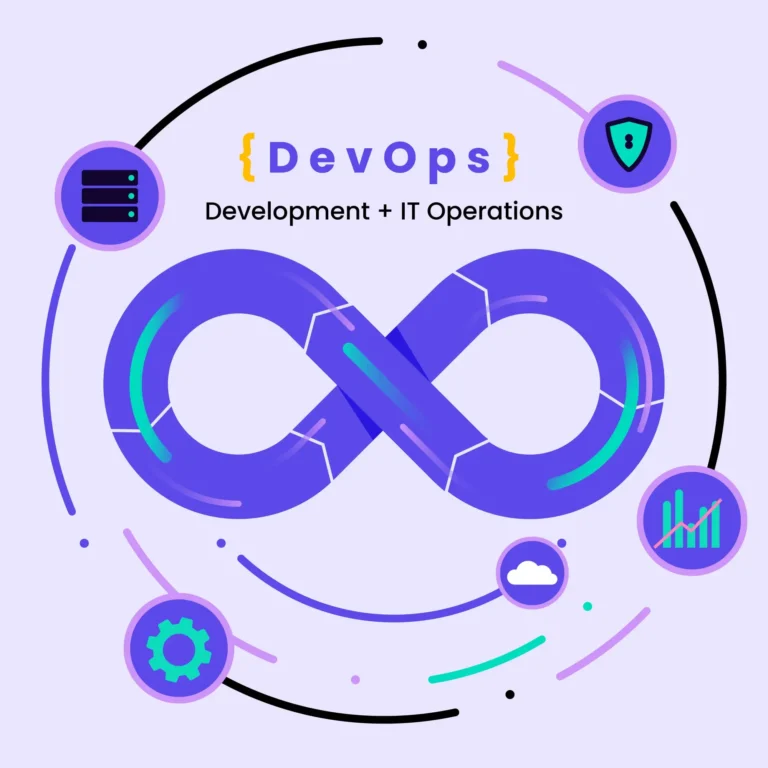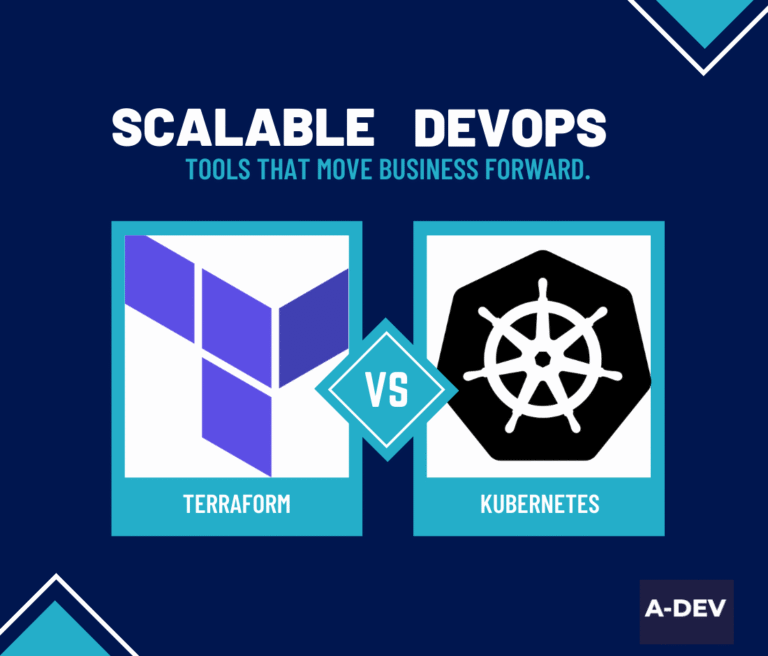In today’s digital age, software production necessitates frequent updates and feature releases to stay competitive. The pressure is on to deliver these changes faster and more reliably, all while maintaining high quality. Enter DevOps: a powerful methodology that breaks down silos between development and operations teams. By fostering collaboration and automation, DevOps engineers streamline the Software Development Life Cycle (SDLC), enabling more frequent deployments. Imagine a world with consistent, high-quality releases at an accelerated pace – that’s the power of DevOps!
This article caters to both aspiring DevOps engineers and companies seeking a competitive edge. Whether you’re looking to enhance your DevOps skills or partner with a qualified DevOps service provider to optimize your IT operations, we’ve got you covered. We’ll delve into core DevOps concepts like continuous integration (CI) and continuous delivery (CD) and showcase a range of DevOps project ideas that bring these practices to life.
Targeting Your Needs: Skills Enhancement or Streamlined IT Operations?

The world of DevOps offers exciting opportunities for both individuals and companies. This section will explore how you can leverage DevOps principles to achieve your specific goals.
Enhance Your DevOps Skills
Are you interested in a career in DevOps? Project-based learning is a fantastic way to develop the practical skills and knowledge employers seek. By working on real-world or simulated DevOps projects, you’ll gain hands-on experience with essential tools and methodologies. This could involve setting up a continuous integration/delivery pipeline (CI/CD) using popular CI/CD tools like Jenkins or Azure DevOps, or deploying a containerized web application with a platform like Docker and Kubernetes.
Developing strong skills is a valuable investment in your future. DevOps engineers are in high demand due to their ability to bridge the gap between development and operations. By showcasing your practical experience with various DevOps project ideas on your resume, you’ll stand out from the crowd and increase your chances of landing that dream job.
Partner for Streamlined IT Operations
Is your company struggling with slow software delivery cycles or inefficient IT processes? Partnering with a qualified DevOps services provider can be a game-changer. A skilled DevOps team can help you optimize your entire SDLC. This includes automating tasks like infrastructure management and deployments, allowing your development team to focus on creating innovative features. DevOps practices also promote collaboration between development and operations, fostering a more efficient and streamlined workflow.
The benefits for companies that embrace DevOps are numerous. You can expect faster delivery times, which translates to quicker time-to-market and a competitive edge. Additionally, automating tasks can significantly reduce costs associated with manual processes. Ultimately, partnering with a qualified DevOps service provider can help you achieve a more stable and efficient IT environment, allowing you to focus on your core business objectives.
DevOps Project Ideas: Unleash Your Inner DevOps Mastermind

Looking to refine your DevOps skillset or embark on your DevOps project? This section offers a curated list of project ideas, categorized by difficulty level, to guide your learning experience. As you progress, remember that these are just stepping stones. Don’t be afraid to experiment and delve deeper into areas that pique your interest – the world of DevOps is constantly evolving, offering endless opportunities for growth.
Beginner: Build Your Foundation
- Simple Web Server with Docker: Embrace containerization! Build a basic web server using Docker. Learn how to create a Docker image, deploy the container, and explore scaling capabilities. This project introduces you to essential Docker concepts and prepares you for more complex deployments.
- Web Application with Apache or Nginx: Get familiar with web server concepts by setting up a simple web application. Choose between Apache, a popular open-source web server, or Nginx, known for its efficiency. This project introduces you to web server configuration and operation, laying the groundwork for future web development endeavors.
Intermediate: Embrace Containers and Infrastructure Automation
- Containerized Application with Kubernetes: As you expand your containerization skills, deploy a multi-component application with Kubernetes. Build Docker images for different application components and manage them as pods within a Kubernetes cluster. This project delves into container orchestration, a key aspect of managing complex deployments at scale.
- Terraform for Infrastructure Provisioning: Explore infrastructure as code (IaC) with Terraform. Learn how to define infrastructure resources like servers, networks, and security groups in Terraform configuration files. Hands-on experience with a Terraform project will equip you to automate infrastructure provisioning for development, testing, and production environments, ensuring consistency and repeatability.
Advanced: Master Microservices, Containers, and Infrastructure Automation
Challenge yourself with DevOps projects that integrate several advanced DevOps practices:
- Microservices-based Java Application: Develop a Java application structured as microservices. This approach allows for modular development, easier scaling, and independent deployments.
- CI/CD Pipeline with Automated Testing: Implement a robust CI/CD pipeline that automates the entire development lifecycle for your Java application. This includes automated testing (unit, integration, end-to-end) at each stage to ensure quality.
- Containerization with Kubernetes Deployment: Package each microservice as a Docker container for lightweight, portable deployment. Deploy these containers to a Kubernetes cluster, leveraging its orchestration capabilities to manage scaling, resource allocation, and service discovery across multiple instances.
- Infrastructure Provisioning with Terraform: Automate infrastructure provisioning for your development, testing, and production environments using Terraform. Define your infrastructure resources (servers, networks, security groups) as code in Terraform configuration files, ensuring consistency and repeatability across environments.
This comprehensive project will equip you with expertise in several key DevOps areas: microservices architecture, containerization, container orchestration with Kubernetes, and infrastructure as code with Terraform. It’s a perfect challenge for those seeking to master advanced DevOps practices and their integration within a real-world Java application scenario.
Bonus: Explore Further!
This list provides a springboard for your DevOps learning journey. Consider these additional ideas to broaden your skillset:
- Security Focus: Integrate security best practices into your DevOps pipeline. Explore tools like SAST (Static Application Security Testing) and DAST (Dynamic Application Security Testing) to identify and address vulnerabilities early in the development process.
- CI/CD Pipeline with Jenkins or Azure DevOps: Set up a continuous integration and continuous delivery (CI/CD) pipeline using popular tools like Jenkins or Azure DevOps. Automate tasks such as building, testing, and deploying your application, streamlining your development workflow.
- Cloud Integration: Explore deploying applications to cloud platforms like AWS, Azure, or Google Cloud Platform (GCP). Learn how to leverage cloud services for infrastructure, databases, and other functionalities.
By actively working on these projects, you’ll gain valuable hands-on experience and solidify your understanding of DevOps principles. Remember, the most important aspect is to keep learning and exploring – the world of DevOps offers endless possibilities for those who embrace continuous improvement!
Fuel Your DevOps Journey: Resources for Continuous Growth

Your exploration of DevOps has just begun! This exciting field thrives on continuous learning and improvement. To solidify your newfound knowledge and propel your DevOps career forward, here’s a treasure trove of resources:
Websites:
- DevOps Roadmap: Imagine a map specifically designed to guide your DevOps learning adventure. This website offers a structured learning path, outlining essential tools and concepts to master, like version control systems (e.g., Git), configuration management tools, and continuous integration/continuous delivery (CI/CD) pipelines.
- The Phoenix Project: Dive into a captivating fictional tale named “The Phoenix Project.” This book explores the challenges and triumphs of a dysfunctional IT environment, ultimately highlighting the transformative power of DevOps practices in achieving a streamlined SDLC.
- Continuous Delivery: Considered a foundational text in the DevOps realm, “Continuous Delivery” delves deep into the art and science of automating deployments, a key aspect of DevOps. Learn how to deploy software frequently and reliably through a continuous delivery pipeline.
Tutorials:
- Docker Getting Started: Get your hands dirty with containerization! Numerous online tutorials, like Docker’s official Getting Started guide, will walk you through building and deploying containerized applications. Explore how to create web app images using Docker and leverage container orchestration platforms like Google Kubernetes Engine (GKE) for managing deployments in production environments.
- Jenkins Tutorials: Jenkins is a popular tool for implementing CI/CD pipelines. Familiarize yourself with its capabilities through various tutorials available online. Master the art of automating builds, tests, and deployments with confidence, including projects that utilize Jenkins remoting for distributed execution.
- Terraform by Hashicorp: Terraform empowers you to manage infrastructure as code (IaC). Hashicorp, the creators of Terraform, offers stellar tutorials to guide you through defining and provisioning infrastructure resources in a structured and automated manner. Learn how to organize Terraform projects effectively and manage dependencies across various environments.
- Kubernetes Tutorial: Container orchestration is a powerful concept, and Kubernetes is a leading platform for managing containerized applications. Dive into Kubernetes tutorials to learn how to manage and scale containerized deployments effectively. Explore features like horizontal pod autoscaling and service discovery to ensure your applications remain performant under fluctuating loads.
Online Courses:
- Udacity DevOps Nanodegree: Upskill yourself with a comprehensive online program. The Udacity DevOps Nanodegree offers a structured learning path that covers various DevOps methodologies and tools, preparing you for real-world challenges, including devops real-time projects that simulate real-world scenarios.
- Coursera DevOps Specialization: Learn from industry experts on Coursera’s DevOps Specialization. This platform offers a series of courses that delve into diverse aspects of DevOps practices, expanding your understanding of the DevOps philosophy and how it fosters collaborative development between development and operations teams.
- Pluralsight DevOps Learning Path: Deepen your knowledge with in-depth courses on Pluralsight’s DevOps Learning Path. Explore popular DevOps technologies and tools, like Selenium for automated testing and Apache web server configuration, solidifying your skillset and making you a valuable asset in the DevOps world.
Beyond the List: Continuous Learning is Key
Remember, this list is merely a stepping stone. As the world of DevOps continues to evolve, so too should your learning journey. Stay curious! Explore new resources, participate in online communities and forums, and attend meetups to connect with other DevOps enthusiasts. By actively engaging with the DevOps ecosystem, you’ll continuously broaden your knowledge base and pave the way for a rewarding career in this exciting field.
Here are some additional ideas to consider as you progress on your DevOps project:
- Software Development Languages: While many DevOps tools are language-agnostic, a solid understanding of programming languages like Java or Python can be beneficial for scripting and automation tasks.
- Advanced DevOps Projects: As you gain experience, consider tackling more complex projects that involve distributed microservice architectures, cloud-native deployments on platforms like AWS or Azure, or implementing site reliability engineering (SRE) practices for ensuring application uptime and performance.
- Web Development Concepts: Having a basic understanding of web development concepts like HTTP requests and web servers will be helpful when working with web applications during deployments.
- Best DevOps Project Ideas: Find project ideas that resonate with your interests and current skillset. Explore resources that offer suggestions for beginners, intermediate, and advanced practitioners in the field of streamlining software development and operations (SDO). These resources can also provide guidance on integrating SDO practices seamlessly into your existing workflows.
By actively engaging with these resources and exploring various project ideas, you’ll gain valuable hands-on experience and solidify your grasp of streamlining SDO principles. Remember, the most important aspect is continuous learning and growth! The world of SDO offers endless possibilities for those who embrace constant improvement. Here are some additional tips to help you on your journey:
- Contribute to Open Source Projects: Participating in open-source projects is a fantastic way to gain practical experience, collaborate with other developers, and learn from industry best practices. Many DevOps tools and libraries are open-source, providing fertile ground for your contributions.
- Practice Makes Perfect: Don’t be afraid to experiment and get your hands dirty. Set up a personal DevOps lab environment using tools like Docker and Kubernetes to test and deploy sample applications. This hands-on approach will solidify your understanding of these technologies.
- Stay Updated with the Latest Trends: The field of streamlining SDO is constantly in flux. To stay ahead of the curve, actively engage with online resources like blogs, webinars, and communities. This continuous learning ensures you possess the knowledge and skills to conquer the latest challenges and advancements in this ever-evolving domain.
- Showcase Your Skills: As you cultivate your expertise in streamlining SDO, consider creating a portfolio website or blog to showcase your talents. Document your projects, learnings, and experiences – these become your credentials for potential employers. Earning industry certifications specific to the methodologies and tools you’ve mastered can further elevate your professional profile.
- Network with DevOps Professionals: Building connections with other DevOps teams is invaluable. Attend meetups, conferences, and online forums to connect with like-minded individuals. Share your knowledge, learn from others, and expand your professional network.
By following these steps and constantly seeking out fresh knowledge, you’ll be well on your way to mastering the art of streamlining SDO. Remember, the path is just as important as the goal. Embrace the hurdles, celebrate your victories, and relish the ever-changing landscape of this dynamic field!
Software Development on Autopilot: Finding the Right DevOps Partner for Seamless Acceleration
In today’s cutthroat software development arena, efficiency and velocity reign supreme. Partnering with a skilled DevOps services provider can be a game-changer, propelling your software developing processes towards automation and streamlined delivery. But with a multitude of providers vying for your attention, how do you identify the ideal match? Here’s a roadmap to guide you in selecting the perfect DevOps partner:
Expertise and Experience in Shepherding Your DevOps Journey
- DevOps Expertise: Look for a provider with a demonstrably strong foundation in DevOps principles and methodologies (e.g., Agile, continuous integration/continuous delivery (CI/CD)). Ensure they understand the entire DevOps lifecycle, encompassing everything from version control (e.g., Git) to deployment.
- Toolset Proficiency: Ensure they possess experience with the relevant tools and technologies that align with your specific needs. Popular tools include Jenkins (CI/CD server), Docker (containerization platform), Kubernetes (container orchestration platform), and Terraform (infrastructure as code (IaC) tool).
- Project Portfolio and Industry Alignment:
- Successful Project History: Request case studies and explore the provider’s portfolio. Focus on projects that align with your industry and the challenges you face in the process. Look for experience with projects involving technologies like Java applications, cloud platforms (e.g., AWS, Azure), or specific frameworks relevant to your domain.
- Industry Understanding: Seek a partner with experience in your specific industry. Their knowledge of your domain will translate to more relevant solutions and a deeper understanding of your requirements, such as high availability needs or adherence to industry regulations.
Speaking the Same Language: Communication is Key to a Flawless Partnership
- Clear and Transparent Communication: The provider should actively listen to your needs and concerns, translating them into actionable solutions. Look for a team that fosters open communication throughout the engagement.
- Shared Understanding: A seamless flow of information ensures everyone is on the same page, avoiding misunderstandings and delays. This includes a clear understanding of your software development process, desired release cadence (e.g., continuous deployment), and success metrics.
- Collaborative Problem-Solving: Open communication fosters a collaborative environment where both teams (yours and the DevOps provider) can work together to overcome challenges effectively. This is crucial when tackling complex deployments or integrating new technologies.
By prioritizing clear communication throughout the selection process, you’ll be well on your way to finding a DevOps partner who integrates seamlessly into your existing workflow, accelerating your development process without sacrificing quality.
Conclusion: Power Up Your DevOps Journey
This guide has equipped you with valuable insights to propel your journey in the exciting realm of DevOps.
For Aspiring DevOps Engineers:
- Project-Based Learning is Key: Hands-on experience is paramount in solidifying your DevOps skillset. Consider the project ideas mentioned earlier, or explore resources like online tutorials and courses to find projects that align with your interests and experience level.
- Continuous Learning is Essential: The world of DevOps is constantly evolving. Utilize the suggested resources, including websites, tutorials, and online courses, to stay up-to-date with the latest trends and technologies.
For Businesses Seeking DevOps Transformation:
- Partnering for Success: A qualified DevOps services provider can be a game-changer for your organization. Look for a partner with a proven track record, relevant industry experience, and a strong foundation in DevOps methodologies.
- Communication is Paramount: Clear and open communication is crucial for a successful partnership. Ensure the DevOps service provider has a collaborative approach and can effectively translate your business goals into a streamlined DevOps strategy.
By embracing these takeaways, you’ll be well on your way to achieving your DevOps goals, whether you’re an individual seeking to upskill or a company aiming to optimize your software delivery process. Remember, the key to success in DevOps lies in continuous learning, collaboration, and a commitment to delivering high-quality software faster and more reliably.






